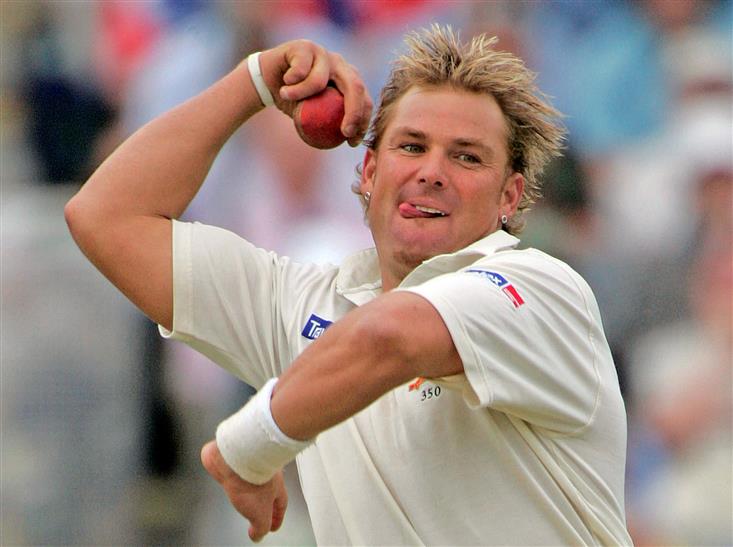Shane Keith Warne was an Australian right-arm leg-spin bowler and right-handed batsman, who played from 1991 to 2013. He is widely regarded as one of the all-time great bowlers in the sport. He appeared in 145 Tests and took 708 wickets. Warne was born in Melbourne on September 13th, 1969.
also read
Warne’s ability to flip the ball over a lot, even on unfavorable pitches, was paired with consistent accuracy and a variety of deliveries. Despite repeated news conferences declaring a “new” delivery for each series he participated in, variety was less obvious in the latter parts of his career. Warne did this by having a relaxed “two-finger” up, two down grips” with the ball not hitting the top part of the palm.
Warne was an effective lower-order batter, once famously dismissed for 99 with a reckless shot on what, it was later shown, was a no-ball. Warne has scored the most Test runs without having scored a century. Warne was a successful slip fielder, with his 125 catches making him 19th in the list of most catches as a fielder in Test cricket history.
Early Career
In the 1983–84 season, Warne made his maiden appearance for the University of Melbourne Cricket Club in the Victorian Cricket Association’s under-16 Dowling Shield competition. He was a useful lower-order batsman who bowled a combination of leg-spin and off-spin. Warne made his first-class cricket debut for Victoria against Western Australia at the Junction Oval in Melbourne on February 15, 1991. In September 1991, he was named in the Australia B squad, who visited Zimbabwe.

Debut for Australia
Before making his Test debut for Australia, Warne had only played in seven first-class matches. When he was brought into the Australian team in January 1992 for a Test against India, he made an unimpressive Test debut. He was dropped for the fifth Test after a bad stint. In the first innings against Sri Lanka, his bad form persisted. However, on August 22, 1992, he captured the final three Sri Lankan wickets in the second innings without conceding a run, helping Australia to a surprising 16-run victory.
Despite his match-winning performance, Warne was pulled out of the second test against Sri Lanka. In the 1992–93 Australian season, Warne was once again left out of the First Test against the West Indies. Following the poor spell by Greg Matthews, who played in Warne’s place, Warne was recalled for the Second Test in Melbourne on Boxing Day, where he took 7/52 in a match-winning second innings display.
Injuries and Wickets
Warne missed the entire Australian summer of 2000–01 with a finger injury. In the northern summer of 2001, Warne made his third Ashes tour and took 31 wickets in the five-Test series, which Australia won 4–1. He grabbed 11 wickets in both innings in the last Test at The Oval, including the 400th of his Test career. He became the sixth person in cricket history to attain the milestone, and the first Australian to do so.
In the summer of 2001–02, Australia hosted home series against New Zealand and South Africa. In three Tests against New Zealand, Warne grabbed six wickets and scored his highest career total with the bat in international cricket in the third Test in Perth. In the three Tests against South Africa, he got 17 wickets, more than any other player.
Ricky Ponting took over as captain of Australia’s One-Day International team from Steve Waugh in February 2002. The ascent of Ponting, who was five years younger than Warne, seemed to put an end to any chance of Warne being named captain of Australia. In October 2002, Australia and Pakistan played a three-match Test series in neutral Sri Lanka and the United Arab Emirates. Warne, who had lost weight in recent months, took 27 wickets and was awarded the Player of the Series.
Ban
Warne was sent home during a one-day series in Australia in February 2003, a day before the World Cup, after a drug test revealed a positive result for a prohibited diuretic. Warne said that he took only one of what he called a “fluid tablet” given to him by his mother to improve his appearance. Warne was found guilty of breaking the Australian Cricket Board’s drug policy and was banned from playing organized cricket for a year by a committee appointed by the board.
Recognitions
In 2000, Warne was chosen by a panel of cricket experts as one of five Wisden Cricketers of the Century, the only specialist bowler selected and the only one still playing at the time. In 2004, Warne was included as part of Richie Benaud’s Greatest XI, a team chosen by Richie Benaud that compared players across all teams and eras using statistics and personal testimonials. In 2007, Cricket Australia and Sri Lanka Cricket decided to name the Australia–Sri Lanka Test cricket series the Warne–Muralitharan Trophy in honor of Warne and Muttiah Muralitharan. Also in 2007, Cricket Australia named Warne in their greatest ODI XI of all time.
On 22 December 2011, a statue honoring Warne was unveiled outside the Melbourne Cricket Ground. Sculpted by Louis Laumen, the bronze statue depicts Warne during his bowling action with an inscription highlighting his cricketing career. In 2012, a grandstand at the Rose Bowl, where Warne played county cricket for Hampshire, was named the Shane Warne Stand in honor of him. In 2012, he was also inducted into the Cricket Hall of Fame by Cricket Australia. In 2013, Warne was inducted into the ICC Cricket Hall of Fame.
Warne revolutionized cricket thinking with his mastery of leg-spin, which many cricket followers had come to regard as a dying art due to the difficulty of bowling the deliveries accurately. Warne’s 708 Test wickets was the record for the most wickets taken by any bowler in Test cricket until 2007. After retirement, he regularly worked as a cricket commentator. He also worked for charitable organizations and endorsed commercial products.
On 4 March 2022, at the age of 52, Warne died from natural causes in Thailand. His death came on the same day as that of fellow Australian Cricketer Rod Marsh, to whom Warne paid tribute on Twitter only a few hours prior to his own death. Australian teammates, the current Australian captain, and many former and current players paid tribute and remembered Warne after his death. Multiple cricket boards also offered their condolences.
